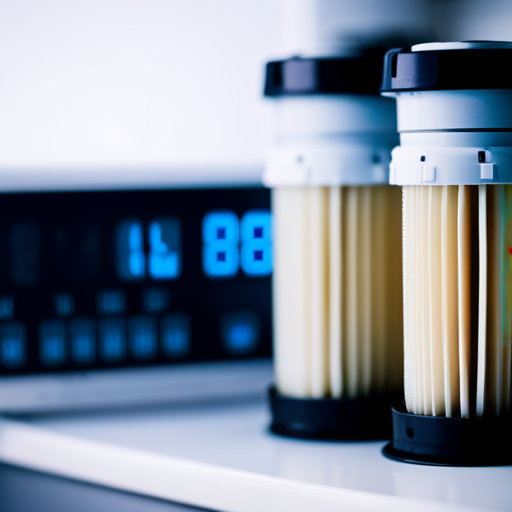Do you find yourself replacing your refrigerator water filter every six months like clockwork? You may be surprised to learn that these filters can actually last much longer than manufacturers suggest.
If you properly store your unused filters, they can last for years without losing their effectiveness. Proper storage involves protecting your filters from moisture and excessive heat, as well as keeping them in their original packaging or an airtight container to prevent contamination.
Understanding the shelf life of your refrigerator water filters can not only improve the quality of your water and ice, but it can also save you money by avoiding premature replacement. So, before you replace your filter again, read on to discover the surprising truth about refrigerator water filter longevity.
Key Takeaways
– Unused refrigerator water filters can last for years if stored properly
– Filters should be stored in a cool, dry place with less than 50% relative humidity and in their original packaging or an airtight container to prevent contamination
– Manufacturers typically recommend replacing filters every 6 months, but this can vary depending on the filter and usage
– Failure to store filters properly can cause bacterial growth and performance degradation, so it’s important to check the condition of filters and replace them if necessary.
Storage and Shelf Life
You can extend the shelf life of your refrigerator water filter by storing it properly. That means keeping it in a cool, dry place with less than 50% relative humidity.
In addition, it’s important to store your filter in its original packaging or an airtight container to prevent contamination. You can also use desiccant packets to help keep humidity low and prevent moisture from damaging the filter.
High temperatures can have a negative effect on the quality of your filter. The ideal temperature range for storing filters is between 50-75 degrees Fahrenheit, and the maximum storage temperature for a refrigerator water filter is 100 degrees Fahrenheit.
If you store your filter in a place that’s too hot, it may degrade the filter quality and reduce its lifespan. So, make sure to store your filter in a cool, dry place to keep it working effectively for a longer period of time.
Replacement Recommendations
When replacing your refrigerator water filter, it’s important to follow the manufacturer’s recommendations for optimal performance. Most manufacturers recommend replacing filters every 6 months.
The lifespan of a filter can vary depending on several factors. Understanding these factors can help you make the most of your filter and reduce the frequency of replacements. Factors affecting filter lifespan include the quality of your water, the frequency of use, and the type of filter media used.
Filters that use activated carbon tend to last longer than those using other types of media. It’s also worth comparing filter lifespan across different brands, as some filters may be designed to last longer than others. By taking these factors into consideration, you can make an informed decision on when to replace your filter and reduce the frequency of replacements.
Importance of Proper Maintenance
Proper maintenance of your refrigerator’s water filter is crucial for ensuring optimal performance and preventing bacterial growth or degradation. Regular maintenance helps extend the lifespan of the filter, allowing it to filter more gallons of water before it needs to be replaced. Additionally, maintaining your filter properly can improve the flow of water and ice production, ensuring that your fridge is always functioning at its best.
One common mistake people make is failing to replace their filter on time. While some filters can last up to a year, most manufacturers recommend replacing them every 6 months. Failure to do so can cause damage to your refrigerator and leave your water untreated.
Another mistake is not storing your filter properly. Filters should be stored in their original packaging or an airtight container to prevent contamination from dust or bacteria.
By properly maintaining your refrigerator water filter, you can enjoy clean and refreshing water for longer.
Conclusion
So now you know that your refrigerator water filter can last much longer than the recommended replacement period of 6 months. All you need to do is store it properly to prevent moisture and excessive heat from affecting the filter, and keep it in its original packaging or an airtight container to avoid contamination.
By understanding the shelf life of your refrigerator water filter, you can improve the quality of your water and ice production, and save money by avoiding premature replacements.
Don’t forget the importance of proper maintenance. Check your filter regularly to ensure it’s still working effectively, and replace it if you notice a decrease in water flow or ice production.
By following these simple steps, you can enjoy clean and refreshing water for years to come.
